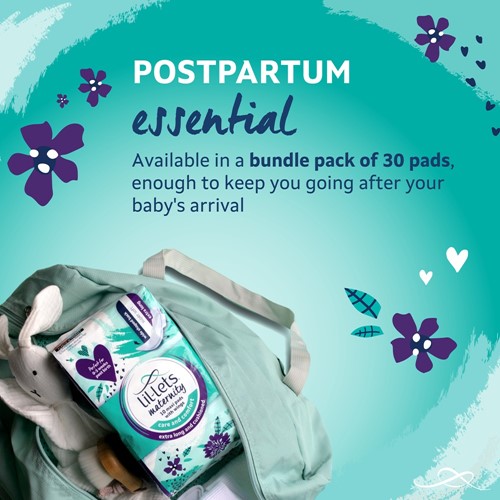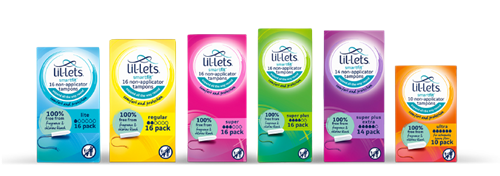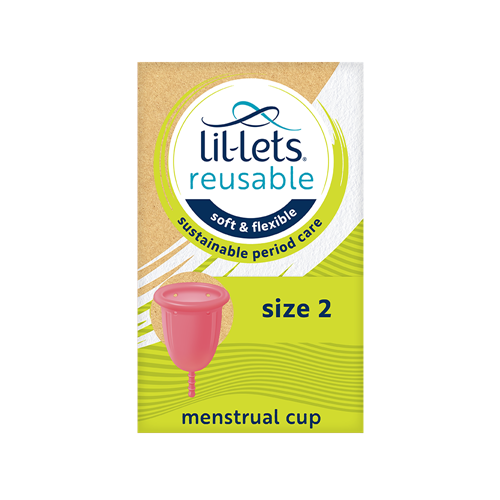You may be wondering when your period will get back to normal again, and what to expect when it does!
Here at Lil-Lets we understand periods and we've got all the answers.
Wondering when your menstrual cycle will return to normal after pregnancy? Read on from the experts in periods and how to manage them.

We think it's really important to understand that the blood released over the days immediately following birth is not a period, it's called Lochia and is the body's way of shedding the uterine lining that supported your pregnancy.
Every body is different, so there’s no set timeline for when your period will return after giving birth. Some mums find their period starts as early as a month after birth, while others don’t get theirs back for a year or more—both are completely normal.
When your period does return, it may be heavier or more irregular than usual at first. This is completely normal as your body adjusts. You might find it helpful to try different products, like maternity pads or tampons, to see what feels most comfortable for you.
If you’re breastfeeding, your period may take longer to return. This is because breastfeeding produces hormones (like prolactin) that can suppress ovulation. Some mums don’t get their period until they stop breastfeeding, while others may notice it returns even while nursing or as they start to wean their baby.
When your period does return, it might be irregular or different from what you’re used to—heavier, lighter, or with more/less cramping. It can take a few cycles for things to settle.
Remember, even if your period hasn’t come back, you can still get pregnant while breastfeeding, so if you’re not planning another pregnancy just yet, it’s a good idea to use contraception. If you have any concerns, your healthcare provider can offer guidance on what to expect.
If you’re bottle-feeding your baby, your period will likely return sooner than if you were exclusively breastfeeding. Many mums find that their first period following childbirth starts around 5–6 weeks after birth, but this can vary from person to person.
Since your hormones are still adjusting, your first few periods may be heavier, lighter, or more irregular than usual. It may take a few months for your cycle to settle into a pattern again.
If you're unsure about what products to use or what your flow may be like so soon after giving birth, you may still want to continue using maternity pads before transitioning to your usual period products. And if you have any concerns about your cycle, it's always a good idea to check in with your healthcare provider at your six-week postnatal appointment.
It's very likely that your period flow after giving birth may not be exactly the same as it was before pregnancy. Many women experience changes, such as:
It’s completely normal for your period to be different after having a baby, but if you experience very heavy bleeding (soaking through a pad every hour) or extreme pain, it’s best to check in with your doctor.
After giving birth, choosing the right period products is important for comfort and convenience. You will most likely notice a difference to your flow for the first few periods you have following pregnancy. And it may now be time to have a re-think of what products are best suited to your needs.

These are designed for postpartum bleeding (lochia) but can also be helpful for heavier periods, especially in the first few months after childbirth. They’re larger and more absorbent than regular pads. And once you are more mobile and ready to get out and about our Maternity Ultra Thin Pads are ideal.
Maternity


Choosing the right product really depends on your personal comfort and convenience, but it’s great to have a variety of options available to see what works best for your body post-birth.
Now it might take a few cycles to figure out what works best for you, so don’t be afraid to experiment with different absorbencies or even try other products like pads or menstrual cups.
Be sure to consult your doctor or a healthcare provider if you have any specific concerns about your menstrual health after having a child.
And check out our Frequently Asked Questions below.
From six weeks after giving birth and onwards: the check-ups, your wellbeing and what you should never forget to mention to your doctor
6 Weeks Postpartum Your New Normal After PregnancyThe 4th trimester is often the greatest time of change for any new parent, leaving you feeling exhausted and overwhelmed.
The 4th Trimester -What To Expect!From six weeks after giving birth and onwards: the check-ups, your wellbeing and what you should never forget to mention to your doctor
6 Weeks Postpartum Your New Normal After Pregnancy
The timing of your first period after birth can vary. For example for mums who choose to breastfeed, it may take longer (up to a year or more) because breastfeeding can suppress ovulation. For those who are bottle-feeding or combining feeding methods, periods may return as early as 6 to 8 weeks postpartum.
Yes, your first period may be heavier or lighter than before, and the flow may be more irregular for the first few cycles. It’s also common for your period to be more painful or to feel different after childbirth.
Yes, postpartum periods can be heavier or longer than usual for the first few cycles. This is because your body is returning to its normal hormonal levels and adjusting after pregnancy. If the bleeding is excessive or lasts for more than a week, it’s a good idea to consult a doctor.
Yes, you can still get pregnant before your period returns. Ovulation (the release of an egg) can occur before you have a period, so it’s important to use contraception if you're not ready to conceive again.
We advise waiting until your six-week postpartum check-up and until you’ve healed fully before using tampons again. Your healthcare provider will give you the go-ahead once they confirm that everything has healed.
Yes, breastfeeding can delay the return of your period. The hormone prolactin, which helps with milk production, suppresses ovulation, so if you're breastfeeding, it may take longer for your cycle to return.
Irregular periods are common in the months following childbirth, particularly if you’re breastfeeding. Your body is still adjusting to the hormonal changes. However, if the irregularity persists for several cycles or you notice unusual symptoms, reach out to your doctor.
Yes, you can start using birth control after your postpartum checkup, whether you’re breastfeeding or not. There are birth control options that are safe to use while breastfeeding, such as the mini-pill, IUDs, or implant methods.
Generally, it’s safe to resume exercise once you feel ready and have been cleared by your doctor. You might find that your energy levels fluctuate during your first period postpartum, so listen to your body and take it easy if needed.
Not necessarily! This myth really does need to be talked about more. Giving birth doesn’t automatically mean you need to switch to a larger tampon size. Your vaginal muscles do stretch during childbirth, but they also regain strength over time.
What matters most is your flow—just like before pregnancy. If your period is heavier than it used to be, you might need a larger tampon (like a super or ultra size). If your flow is lighter, a regular or even a light tampon may still work just fine.